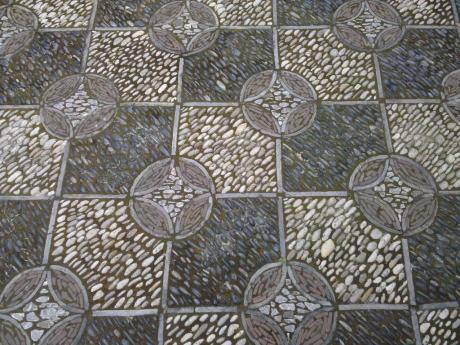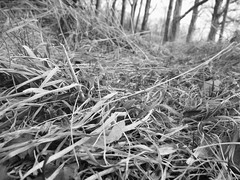Details of Lan Su Chinese Garden (Portland, OR)
23 October 2010
Several weeks ago some good friends introduced us to one of their favorite places in Portland, the Lan Su Chinese Garden and Tea House. I took many pictures, and these are a random sample of them, all of them details. There are thousands of wonderful elements at the Garden, but I had, it seems, a particular attraction to the tile work and windows.
~*~***~*~
Last week we saw the production of Hamlet at the Ashland Shakespeare Festival. I had a hard time getting to sleep that night. Something about the production had bothered me, as if the play had something to communicate to me which had failed to get through. I reread just the first act the following morning, and then a friend recommended the essay by Harold Goddard on the play.
The essay by Goddard opened up for me, more than a little, what is some of the meaning and value of the play I could sense but could not clearly see Ashland’s production. For instance, that it truly is a tragedy for Hamlet. He is a lost man, a son enslaved to his father’s conditional love, and he is wrong for killing the king. In the struggle between art and violence/revenge, art loses. “Hamlet had the creative instinct and capacity to alter the royal occupation from what it always has been, war, to what it ought to be, art: not ‘art’ as amusement or distraction, but art in its deepest and most religious sense.” So says Goddard on the last page of his essay, playing with the not unprecedented idea of what Hamlet may have become if he had not succumbed to violence. If art is opposed to war, and at its deepest sense is a religious term, what can Goddard be implying, then, by “religious” if not an understanding of the living object of our worship as one who is without violence in every part! A living and creative heavenly Father who longs for us to be free of any earthly father who would demand violent obedience.
Hamlet gives in to the temptation to please his father. The one who did not give in to temptation understood that all earthly paternity is wrapped up in violence: “And call no man your father on earth, for you have one Father who is in heaven.” (Matthew 23:9)
At one point only, says Goddard, are we given a glimpse of the true Hamlet, free of his father, alive and creative to (you might say) what his heavenly Father has given him:
“…and then the players enter. Instantly, we have another Hamlet — a man happy as a man can be only in the presence of the thing he was made for… The very tone of his voice alters… Here, we instinctively feel, is an echo of the young Shakespeare when the wonder of his destined vocation first dawned over him. Like his creator’s, Hamlet’s heart of heart is in dramatic and poetic art. … He cannot wait. Almost before the greetings are over he asks the First Player for a taste of his quality and hangs entranced on the recitation. Even when Polonius interrupts he says nothing, and at a second interruption though he can joke, he forgets to jeer… At the end, he can even address to him in complete seriousness some of his deepest wisdom:
POL.: My lord, I will use them according to their desert.
HAM.: God’s bodykins, man, better. Use every man after his desert, and who should ‘scape whipping? Use them after your honour and dignity. The less they deserve, the more merit is in your bounty.
That clinches it–proves how utterly the Prince’s evil spirit is exorcised. For once, Hamlet can treat even Polonius as a man. This is God’s Hamlet.”
Hamlet is the portrait and predicament of anyone trapped between the life of true and creative enjoyment (worship) doing what one has been given to love, and the eternal struggle to please the paternal authorities which demand violence of us and are not happy with us as we are.
At another point, Goddard quotes Dostoevsky’s Father Zossima — a man who, like Hamlet, found himself in a duel, but who, unlike Hamlet, received from his heavenly Father a vision of himself as forgiven and was able to accept it:
“Men are made for happiness,” said Father Zossima, “and anyone who is completely happy has a right to say to himself, ‘I am doing God’s will on earth.’ “

















